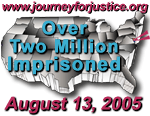 More on Purpose
and Timely Agenda More on Purpose
and Timely Agenda
It doesn't matter if you plan a demonstration, a press conference,
a public forum for speakers, or a picnic in the park. Your event
needs a purpose, and agenda. For the purpose of simplicity, we
illustrate our suggestions by using the example of a formal public
meeting with speaker presentations.
Before the oral portion of presentations Chuck and I make
begin in earnest, we sometimes show a short film, a 10 minute
'trailer' of a documentary in process.
Some groups have shown segments of other pertinent video documentaries
at public meetings we join. We tell the audience about one of
our current campaigns, the Petition for Relief of Drug War
Injustice. The petition seeks public support for a system
of early release in the Federal Prison system.
The film, oral presentations, slide shows and other 'visual
aids' we use, help us reach our public education goals.
We also want to network with people that gather, introduce
them to other local people, assisting local organizers in growing
their numbers of supporters. That is our purpose in traveling
the country, and we begin working on these goals the moment we
arrive for a meeting or event.
Our message of drug war injustice fits into the broader issue
of Human Rights, Social Justice, Peace Movements (yes, this is
the longest war and waged at 'home'), and many other large and
broader concerns. Within the drug reform movement are groups
that focus on clean needles for addicts, drug treatment availability,
marijuana law reform, etc.
Our focus fits into both broad concerns, and many focus issues
within the broad issue of the war on drugs. As organizer, you
will be sure to let the Journey for Justice team know what the
usual focus of your group or organization is, if it isn't obvious,
or if are unacquainted.
The day or evening of your public event, local volunteers
will arrive early to set up information table, making sure that
two tables are available for the Journey for Justice display.
Volunteers will make sure that any special equipment is present,
and working properly.
At least two persons should be available to greet people that
arrive and thank them for coming and invite them to visit the
tables. They should arrive no later than a half hour before the
scheduled meeting begins.
One volunteer should be assigned to answer questions of people
arriving, and to greet people that visit the tabling area. You
will want to collect names, addresses, emails and phone numbers
from the public willing to share this information with local
organizers. If one person gently reminds people that we would
appreciate their contact information, all the better. To grow
local groups, we need local contact information of the attending
public. You will want to contact them for future meetings, actions
and events.
At least some people start arriving a half hour before a public
meeting. If media turns out to cover your Journey for Justice
public meeting, you can count of them as early arrivals. You
will want to be set-up, and have the appointed public spokespersons
present at least a half an hour before the event starts.
A designated 'spokesperson' will introduce Journey for Justice
speakers, and any local guest speakers. No matter what type of
public meeting agenda; panel of speakers, just Nora 'n Chuck,
video presentation, debate, or format of your choosing -- you
should always allow time for questions and comments after presentations.
If a local spokesperson is not sharing public speaking time,
and you have pertinent local information, websites, upcoming
meetings, etc., write that information down. One of the public
speakers that evening will need to share this information with
the audience.
When the meeting is over, people will visit the tables again.
Remember to have volunteers at the tables when the formal presentation
part of the evening is over.
Keeping the meeting timely, not running over is important.
Make sure that all guest speakers know the agenda, have their
speaking times and know exactly how long their portion is. It
is good if the journey organizer reminds the speakers of their
obligation to stay within the allotted time. You want time for
audience participation, and for people to mingle and meet each
other when the formal portion of the meeting concludes. If you
go 'overtime' -- the public with quickly scatter. This is not
the result that we want.
People come to public meetings to be educated, but also to
share their thoughts. If questions arise, they need to be answered.
We don't hold "question and answer' periods, but we do encourage
'questions and comment' periods in most public meetings. We are
all the 'experts' - many people that will attend, will have some
of our answers.
Remember to use the Public Meeting Checklist in your planning,
it will make what appears complicated -- manageable with a small
group of dedicated volunteers.

|









